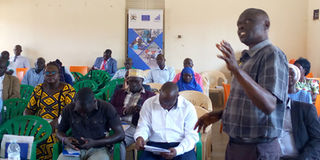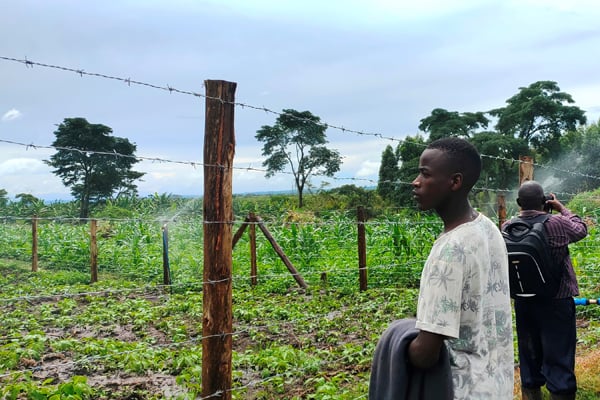Prime
Yumbe farmers to benefit from Shs7 billion irrigation project

Yumbe production officer Rashid Kawawa makes a presentation during the launch of the micro-scale irrigation project. PHOTO | ROBRT ELEMA.
What you need to know:
- The project is funded by International Intergovernmental Fiscal Transfer through ministry of Agriculture targeting individual farmers who will co-fund the technology.
At least 432 farmers in Yumbe District are set to benefit from micro-scale irrigation program with support from the government of Uganda through ministry of Agriculture, Animal Industry and Fisheries (MAAIF).
The project is funded by International Intergovernmental Fiscal Transfer through ministry of Agriculture targeting individual farmers who will co-fund the technology.
About Shs7.7b is expected to support the farmers to purchase irrigation equipment targeting subsistence farmers who are willing to move into commercial agriculture.
Some of the criteria for selecting the farmer beneficiaries include, security of the land, suitability, a water source and distance to the field, farmer crop production and marketing plan, among others.
Speaking during the sensitisation meeting on the program at the district headquarters Stephen Bakole the Yumbe District Agriculture Officer says, this irrigation program is an opportunity for farmers to overcome the harsh weather conditions.
Mr Bakole says farmers will be supported in two forms of powered technology and water pump. For a generator, the farmer will be supported maximum of Shs5m and for solar, the farmers will be supported with a maximum of Shs7m per acre of land. The support can go up to Shs14m and Shs8m for the 2.5 acres of land for generator and solar power equipment, respectively.
“If one a farmer with 2.5acres wants to use solar, they will access Shs18m. So you pay 25 percent of Shs18m as co-funding which is approximately Shs4.5m. This money is for you so, you (the farmer) need to mobilise your share to acquire the Shs18m for the irrigation set,” he says.
In this project, he says, government targets high value crop farmers such as vegetables production like tomatoes, onions and cabbages but those with perennial crops such as coffee and banana can benefit.
Rasul Drajiga, the Assistant Chief Administrative Officer says natural conditions in form of harsh weather frustrates farmers a lot.
“Irrigation doesn’t mean there must be a huge water body like R. Nile but any natural water source can work. Unless we change our mind, we would say the weather is bad and therefore do nothing and suffer from hunger,’’ he says.
He adds that one of the conditions of this irrigation program is, having a stable water source.
“This irrigation means creating the systems by using the water source available to farmers”.
Mr Eric Sitaku, the credit Administrator at Centenary Bank says the bank will support the farmers with agriculture loans to be able adopt the irrigation equipment.
“We are blessed with abundant land and for sure if we can make use of this, it will be good. Many farmers in the area used to come for Agriculture loans but I get surprised when I go for loan recovery, sometimes farmers claim that crops have failed so we want such farmers who get loans from us to give us information about crop failures so that we have trust in them,” he says.
He says, before a farmer accesses a loan from the bank, they first need to assess their enterprise and previous experience.
Mr William Asio, the Assistant settlement commandant in the Office of the Prime Minister says local government leaders need to design a social behavior change strategy so that it helps the community to understand the project.
“As the government, we are trying our best to bring opportunities through the various projects but some end up being failing. If we want this project to succeed, let the local governments come up with bylaws which will help to address the issues of stray animals and other negative activities that affect farming in the community,” he said.
Mr Linus Kayiah, the district vice chairperson said, the project needs a collective responsibility for its success and that the stakeholders should mobilize the people to engage in production. “Once we embrace this project and our people can change their attitude, it would make us independent,” he says.
Concept
Micro-scale irrigation is when a farmer irrigates a small plot. For example, a farmer can use a pump to take water from a nearby stream, and a hose to distribute the water in the plot. The Micro-scale Irrigation scheme helps farmers buy irrigation equipment at a lower cost, teach them how to use the irrigation equipment and when and how to water their crops.




